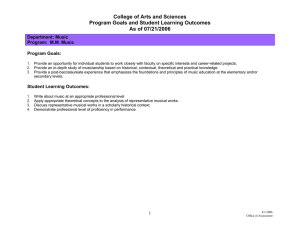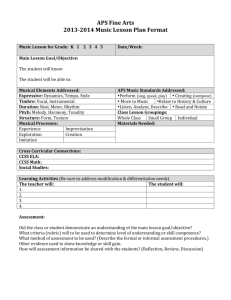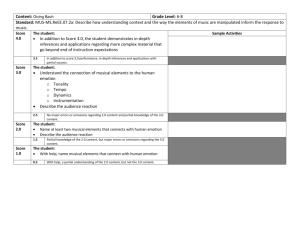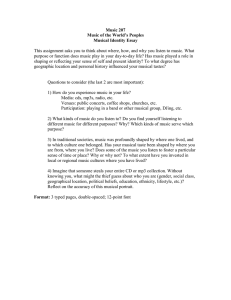Collins Memorial Library Undergraduate Research Award
advertisement
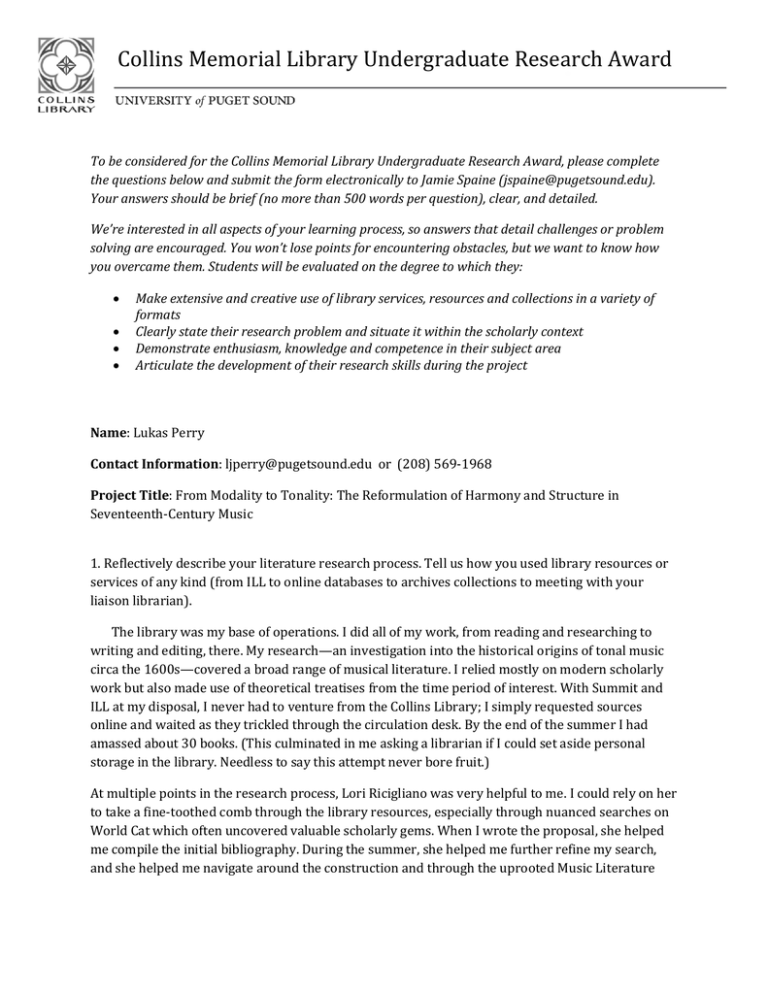
Collins Memorial Library Undergraduate Research Award To be considered for the Collins Memorial Library Undergraduate Research Award, please complete the questions below and submit the form electronically to Jamie Spaine (jspaine@pugetsound.edu). Your answers should be brief (no more than 500 words per question), clear, and detailed. We’re interested in all aspects of your learning process, so answers that detail challenges or problem solving are encouraged. You won’t lose points for encountering obstacles, but we want to know how you overcame them. Students will be evaluated on the degree to which they: Make extensive and creative use of library services, resources and collections in a variety of formats Clearly state their research problem and situate it within the scholarly context Demonstrate enthusiasm, knowledge and competence in their subject area Articulate the development of their research skills during the project Name: Lukas Perry Contact Information: ljperry@pugetsound.edu or (208) 569-1968 Project Title: From Modality to Tonality: The Reformulation of Harmony and Structure in Seventeenth-Century Music 1. Reflectively describe your literature research process. Tell us how you used library resources or services of any kind (from ILL to online databases to archives collections to meeting with your liaison librarian). The library was my base of operations. I did all of my work, from reading and researching to writing and editing, there. My research—an investigation into the historical origins of tonal music circa the 1600s—covered a broad range of musical literature. I relied mostly on modern scholarly work but also made use of theoretical treatises from the time period of interest. With Summit and ILL at my disposal, I never had to venture from the Collins Library; I simply requested sources online and waited as they trickled through the circulation desk. By the end of the summer I had amassed about 30 books. (This culminated in me asking a librarian if I could set aside personal storage in the library. Needless to say this attempt never bore fruit.) At multiple points in the research process, Lori Ricigliano was very helpful to me. I could rely on her to take a fine-toothed comb through the library resources, especially through nuanced searches on World Cat which often uncovered valuable scholarly gems. When I wrote the proposal, she helped me compile the initial bibliography. During the summer, she helped me further refine my search, and she helped me navigate around the construction and through the uprooted Music Literature Collins Memorial Library Undergraduate Research Award section. In the last days of writing, when I could almost no longer bear to stare into the computer screen, she gave a fresh perspective on various details of citations. To obtain music scores, I used the International Music Score Library Project and its choral counterpart, the Choral Public Domain Library. These online databases make available thousands of scores which are in the public domain, and from them, I obtained multiple editions of the pieces with which I was working. 2. Tell us about a challenge you faced during your literature research and how you overcame it. Perhaps the most significant obstacle I encountered was in music analysis. Early on in the research process, I had to rely largely on other scholars’ interpretations of certain works. I lacked a nuanced understanding of seventeenth-century music which prevented me from confidently embarking on my own analysis. My early writing reflects more of a synthesis of previous literature. Then, with the encouragement of my advisor, I tried to achieve more originality in my analysis and my voice. As the summer progressed and I “mastered” more of the material, I began to take on entirely independent analysis of certain works, and I was able to shape my paper into a truly original creation. In a broader sense, this obstacle was my initial lack of confidence in my ideas. However, the process of the research itself allowed me to overcome this obstacle. Another obstacle was primary sources in foreign languages. In fact, all of the theoretical treatises with which I was dealing were written either in French, Italian, German, or Latin. I know none of these languages; I know only enough Spanish to deduce brief phrases or titles in Italian or Latin. As a result, I could not directly interact with these sources. However, as I became better acquainted with numerous bibliographies, I managed to track down a few English translations for sources of interest. In the end, I can take pride in the diverse bibliography I developed which includes a substantial corpus of secondary literature, a handful of primary sources, and, perhaps most importantly, numerous musical scores. 3. How does your research contribute to the scholarly conversation in your field? What is the significance of your research, in layperson’s terms? Numerous scholars have undertaken searches for the origins of tonality, but these scholars have often investigated different time periods, musical genres, or theoretical concepts in their search. My research is unique in that it weaves together many of this topic’s differing strands. Rather than just a synthesis, however, my research reflects the thorough understanding I gradually developed throughout the summer. Tonality—a musical syntax which governed musical works for nearly two centuries (1700-1900) and has returned in the past few decades—is a central part of our musical heritage. Composers from Bach and Mozart to Beethoven and Brahms built their masterpieces on the tonal system. The tonal system relies on orienting melodies around a major or minor scale and then employing a hierarchy of three-note chords, or triads, that arise from this scale to give a piece of music a sense of Collins Memorial Library Undergraduate Research Award “key.” The older system of modality which arose in the eighth and ninth in order to organize liturgical chant flourished until the seventeenth century. The seventeenth century is a time period seen by many historians as a period of transition in musical language; composers were gradually shifting to a more tonal idiom. As such, the seemingly elusive seventeenth century constituted the focus of my research, as I hoped to shed light on the musical organization behind some of this period’s most hallowed works. While a broad topic such as this constantly avails itself to being recast and rethought by historians, I feel that I successfully incorporated a variety of subtopics. Throughout the course of my paper, I consider thoroughbass methods (a type of improvised accompaniment), theoretical treatises, and the music of Claudio Monteverdi and Arcangelo Corelli in my search for the origin of tonality. Scholars have previously treated these topics independently, but I feel that I have forged a link between them, conveying the historical “flow” between them in my writing. My goal is to have crafted a study that does justice both to the breadth and specificity required of this topic and serves either as an extended study for a music survey course or as a springboard for further focused research.
